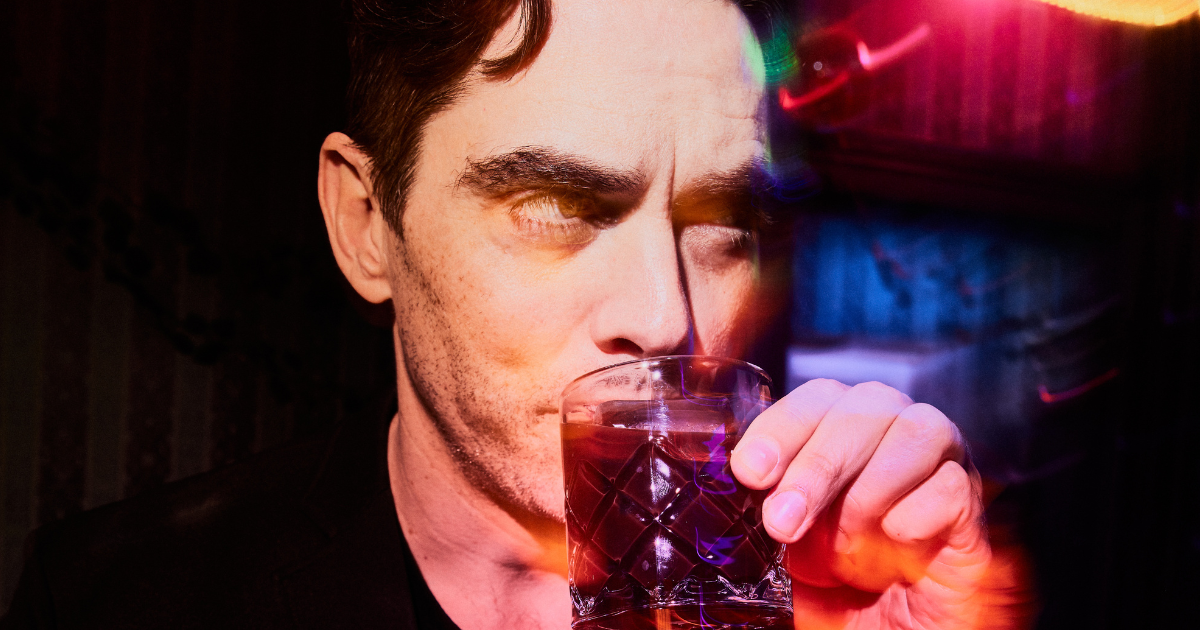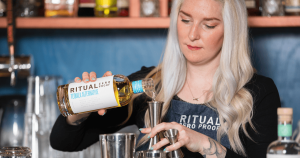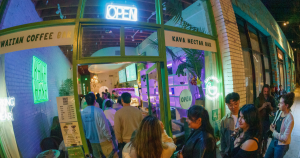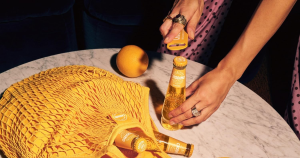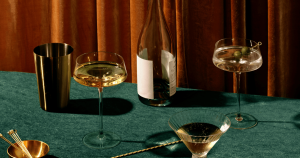In an era where social drinking norms are rapidly evolving, John Wiseman’s journey from cocktail enthusiast to the pioneer of Curious Elixirs offers a fascinating glimpse into the burgeoning world of non-alcoholic cocktails. Nearly a decade ago, the notion of a “booze-free cocktail” might have seemed too niche, but JW’s homemade experiments in the Hudson Valley have since blossomed into an industry-defining brand.
This interview delves into the origins of Curious Elixirs and explores the pivotal moments and challenges that transformed a kitchen hobby into a trailblazing company. From early product validation to inspiration from Martha Stewart that sparked decisive action, JW’s story is not just about reducing alcohol consumption—it’s about redefining the very nature of how we socialize and celebrate.
JW, you’ve been in the alcohol alternatives space for almost one decade, which, in this category, is a while! What was the initial inspiration for building a non-alcoholic cocktail brand when there really wasn’t that much happening in this space?
The initial inspiration for Curious Elixirs was drinking too much and being a cocktail nerd. Back in 2012, after a crazy night with 20 drinks, I felt fine the next day. That was alarming. I knew that I needed to cut down on drinking. Fortunately, it wasn’t challenging for me, but there weren’t any good non-alc options.
When hanging out with friends in Manhattan or Brooklyn back in 2012, you were lucky to find a ginger beer. So I started tinkering in my kitchen, just trying to make something fun and complex for the days when I wasn’t drinking. That’s how Curious Elixirs was born, not far from the city in my kitchen in the Hudson Valley. That’s where I would really sit down and have the time to fully tinker.
Many people are inspired to tinker at home as you did, but few take it to the stage of a fully fledged company. What pushed you to go beyond your kitchen?
Two moments stand out. At the time, I was Head of Marketing at Thrillist, and I had also just opened a whiskey bar and a nightclub. We were also in the process of opening a hotel in Rockaway Beach. There, I had a dispenser with the prototype for Curious No. 1, which I was making as an easy option for those of us who were drinking less or didn’t want to drink at all. That dispenser drained faster than any other drink at the party, and I thought, “Wow, people are just drinking this because it’s delicious. They actually don’t even care that it’s non-alcoholic.” I didn’t have it labeled. I was just testing it out. It was this beautiful red drink in a dispenser, and people were just really vibing with it. Even the hardcore partygoers liked it because they don’t even know what was in it. They simply liked it because it tastes great. That was surprising.
The second moment happened one year later, when I was watching Martha Stewart speak. She was asked, “Was there ever a time when you doubted yourself and thought things might not work out?” Without hesitation, she replied, “Nope, never, not once.” That was so not me. But I was struck by it, almost like being struck by lightning. When Martha said that, I just knew it was time to make Curious a reality. You can borrow Martha’s confidence anytime you want. So I did, and I continue to do that. Whenever I’m feeling a little less confident, I think back to that moment. It has served me well over the past decade as I’ve built Curious.
Wow, as a huge Martha Stewart fan, I love that she factored into your early Curious days.
Fast forward two years from then, and I’m dropping off samples for Martha! I ended up meeting one of her right-hand people, and I was able to give some to her and her team.
So you started with some early product validation. You built some confidence, some of which was borrowed from Martha Stewart. In those early days, there must have been a lot of challenges. What were some of the roadblocks you encountered, and how did you decide to continue on?
Challenges are essential for growth. There’s no other way. The early challenges were death by a hundred cuts, but you have to believe that you’ll figure it out. You have to keep talking to people who know more until you do. That’s how you navigate challenges in life. You don’t know what you don’t know. I didn’t know how to make non-alcoholic Negroni. I researched it extensively, and there was nothing great out there. It was trial and error, talking to top bartenders, and getting inspiration because I love drinks and I love food. It’s so much fun to work on.
But one of the biggest challenges was figuring out how to make these at scale. It’s one thing to make them in your kitchen, but it’s another when you’re figuring out pasteurization for one thousand bottles, let alone what we’re doing now with hundreds of thousands. I’d say that and shipping—how to ship glass bottles. It took me a while, and I had a lot of help. After producing it, selling it brings its own set of challenges. When I launched back in 2015, there was a need, but no community of “sober curiosity” for a couple more years. Finding your people was a lot harder. Once you put it out there, though, you can strike a chord.
That’s super helpful advice for aspiring beverage entrepreneurs. The challenges never stop. You’re just switching sets of challenges as you go.
Yes. You never really get to rest on your laurels. It just becomes a different opportunity for growth. That’s what we’ve tried to do with Curious because we were creating an industry from scratch. There was no alcohol alternatives industry. I created the term “booze-free.” A lot of people say “alcohol-free” and “zero proof.” I wanted something with a reference. That’s why we’re “booze-free craft cocktails.”
And why are you called “Curious Elixirs”?
We’re called Curious because we just want people to ask. What does life look like with less alcohol? Can it be more fun? Can it be more spontaneous? Can it be more creative? Can it be more delicious? I think the answer is yes.
On the elixir front, our cocktails help to gently support your body with adaptogens and herbs. These herbs and adaptogens have been used for thousands of years. We didn’t invent that. But making a craft cocktail infused with that—we were the first people to do that.
They’re doing something else to your body that alcohol isn’t, like rhodiola in Curious No. 1. That helps increase your serotonin and dopamine precursors. That lifts your natural mood, for most people. I also included gentian root not only for bitterness but also because it boosts your circulation, so you get a little flushed, like you do when you’re having a drink of alcohol.
Some brands shy away from functional elements. What led you to include them? What other key formulation decisions did you make?
We decided to use low doses of various functional herbs and adaptogens, enabling people to use it as a primer for testing other herbs. We’re not doing supplement-level doses. We’re using like 400 milligrams per bottle or 200 milligrams per serving. This allows you to test and find what feels good for your body.
That’s a bit woo-woo for some people, but when you start having a cup of strong coffee and you’re like, “wow, this is lighting me up,” it’s the same thing. You need to key into different herbs and adaptogens to see which ones work for you. That’s all we’re trying to do.
Overall, when it comes down to it, using the cleanest ingredients possible is crucial. It separates Curious from 99% of the brands in the non-alcoholic space. We avoid natural flavors, preservatives, and any unnecessary additives. We stick to clean ingredients.
Shifting now from formulation to socialization, what’s the role of brands like Curious in the future of socializing?
Our mission at Curious Elixirs is to transform how we drink socially. That’s really the core mission, and it has been since day one. We started Club Curious—our speakeasy located somewhere in Brooklyn—because we wanted to see what could happen in a club centered on creativity instead of alcohol.
It’s an experiment, our small space. It only holds about 100 people. By day, it’s our office where our team meets. By night, we have burlesque performers, Grammy winners, comedians, and more. It’s such a joy to gather all of these different creators who are just here to make some cool stuff. That’s really what we want Curious Elixirs to be. We want to be a supporting character in creative people’s lives.
In terms of social drinking more broadly, what do you think is next? Since you launched Curious, we’ve seen the term “sober curious” come into the cultural consciousness. We’ve seen moderation trending. What do you think will be the scene for social drinking in five or 10 years?
The best way to predict the future is to create it. I don’t know who said that. It’s not my line, but that’s what we’re trying to do with Club Curious. I think that, five or 10 years from now, you’ll continue to see an increase in alternative nightlife. Maybe not completely alcohol-free spaces, but people finding more connection with their fellow humans when they’re not as intoxicated. That’s going to continue to increase.
But we’re not trying to push this down anybody’s throats. We want people to ask the questions themselves. What does life look like with less alcohol? Do I like it more or less? Is my life more satisfying? Are my relationships stronger? Is my sleep improving? Is sex better? So what does it look like in five to ten years? I think it’s going to be up to the people who heed these questions, those who start asking themselves who they want to be and how they want to be.


